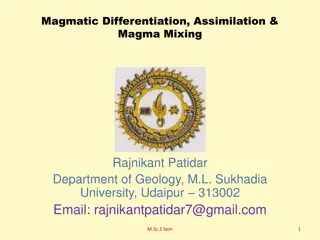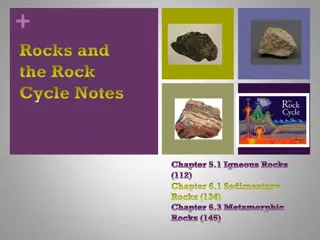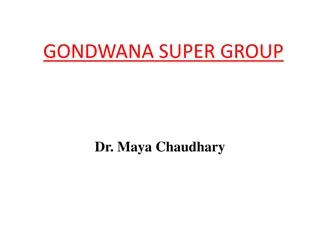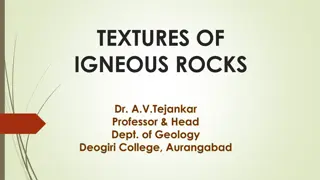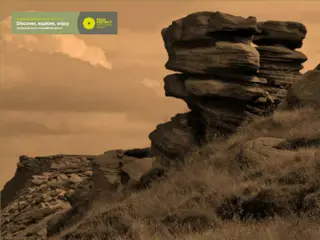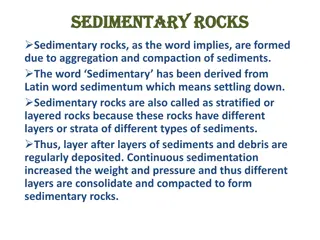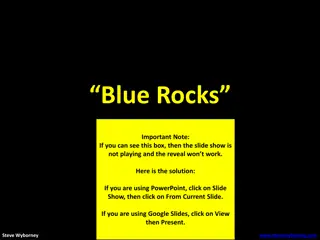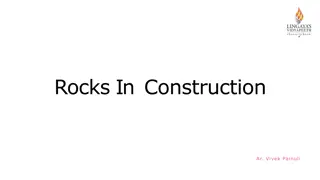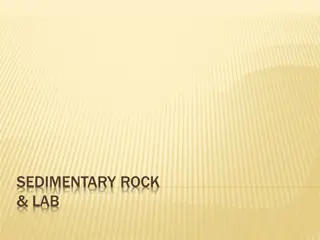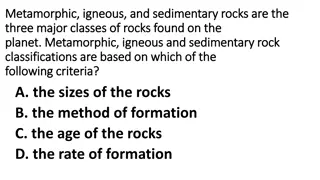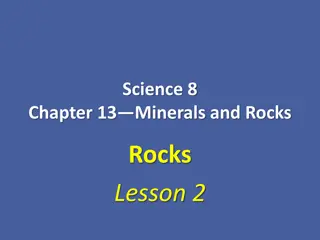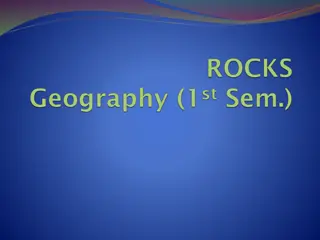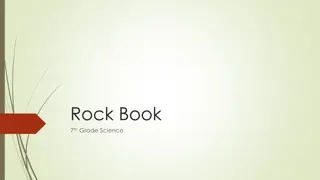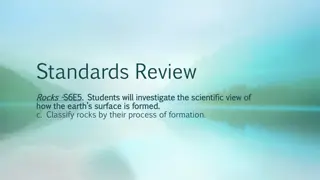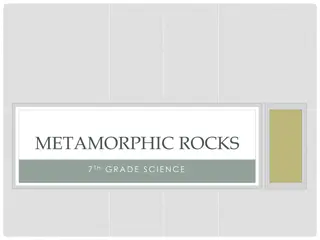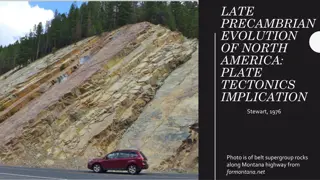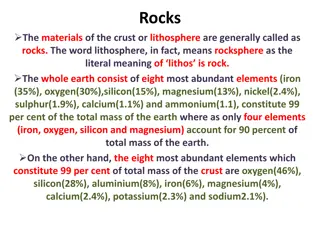Understanding Different Types of Rocks and How They Form
Rocks are essential components of Earth's crust, consisting of various minerals held together by natural cement. They can be categorized into three groups: Igneous, Sedimentary, and Metamorphic rocks. Each group is formed differently, either through volcanic activity, sedimentation, or existing rock transformation. Examples like Granite and Basalt in Igneous rocks, Limestone in Sedimentary rocks, showcase the diverse nature of rocks and their formations.
Download Presentation

Please find below an Image/Link to download the presentation.
The content on the website is provided AS IS for your information and personal use only. It may not be sold, licensed, or shared on other websites without obtaining consent from the author. Download presentation by click this link. If you encounter any issues during the download, it is possible that the publisher has removed the file from their server.
E N D
Presentation Transcript
Rocks Material that forms the earth s crust.
What are rocks made from? Rocks are made up of different minerals. These minerals are held together by a natural cement. There are many different types of rocks with different mineral content, hardness, and texture.
Types of Rocks There are many different types of rocks. However, all rocks can be divided into 3 groups, depending on how they were made. The 3 groups are, 1. Igneous rocks 2. Sedimentary rocks 3. Metamorphic rocks
Types of Rocks Igneous Rocks They are formed as a result of volcanic activity. Hot molten magma cools into solid rock on the earth s surface or deep underground. Sedimentary Rocks They are formed from the particles of rocks, dead plants, and animals. They were deposited on the bed of seas and lakes and built up over time to be compressed into layers of solid rock. Metamorphic Rocks They are formed from rocks that already exist. Igneous or sedimentary rocks are changed into new harder rocks by great heat or pressure.
Igneous Rocks Igneous rocks are formed as a result of volcanic activity. Two common types of igneous rocks are Granite and Basalt. Granite is made when magma cools very slowly, deep in the earth s crust. Over millions of years the layers of rock above the granite are worn away, leaving the granite exposed at the surface.
Igneous Rocks Basalt is made when lava from a volcano cools very quickly on the earth s surface. It is black in colour and is shaped as hexagonal blocks, as seen in the Giant s Causeway in the Antrim-Derry Plateau.
Sedimentary Rocks Sedimentary rocks are made up of small particles or sediments which are compressed together to form layers of solid rock. Limestone, sandstone, coal, and shale are all examples of limestone rocks.
Limestone Limestone is formed at the bottom of the sea. It is made from the skeletons of small sea creatures, fish, and shells. These fall to the bottom of the sea when the animals die. They pile up over millions of years and the weight compresses the particles into layers of solid rock. Chemicals in the sea water also help to cement the particles together into solid rock. Limestone is the most common type of rock in Ireland, and can be seen best in the Burren in Co. Clare. It is used to make monuments, and in construction of buildings. It is also used to make cement and to improve soil fertility
Sandstone Sandstone is red/brown in colour. It is made when lots of sand is worn away from the earth s crust. This sand is carried by the wind and rivers. They are deposited in the sea or in a desert where the layers build up over time. The layers become compressed and cemented together to form sandstone
Metamorphic Rocks Metamorphic rocks are made from other rocks that already exist. The older rocks are changed into new types of rocks because of great heat or pressure. Marble, quartzite and slate are examples of metamorphic rocks.
Quartzite Quartzite is an extremely hard rock made mainly from quartz. It was made from sandstone which was changed by great heat or pressure. It is found on the top of many of Ireland s mountains such as Croagh Patrick and the Sugarloaf. It is used in road chippings, sandpaper, and watches.
Marble Marble is formed from limestone. It is a very hard rock that can be cut and polished. It is found in Connemara and Co. Cork. It is used to make fireplaces, gravestones, and ornaments
Slate Slate is made from the sedimentary rock shale. It is used to make slates to roof houses and for billiard / snooker tables.
Rocks A Valuable Natural Resource Rocks are valuable natural resources. People use rocks for many different purposes. For example, Granite is used in building and making monuments. Limestone is used in building, making cement, and as a fertilizer. Quartzite is used for road chippings, sandpaper, and watches. Marble is used for fireplaces, ornaments, and gravestones. Slate is used to make roofs and on snooker tables.
Rocks A Valuable Natural Resource However, rocks also contain other important resources which we use. These include, Metal ores: iron ore, copper, lead, zinc. Precious metals: gold, silver, platinum. Gemstones: diamonds, opal, jade. Fossil fuels: oil, gas, coal, peat.


